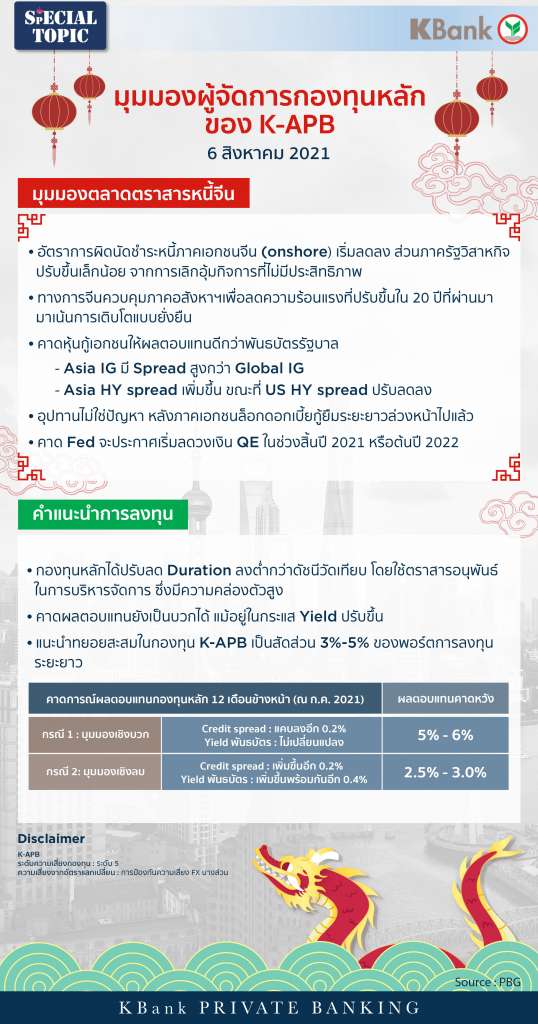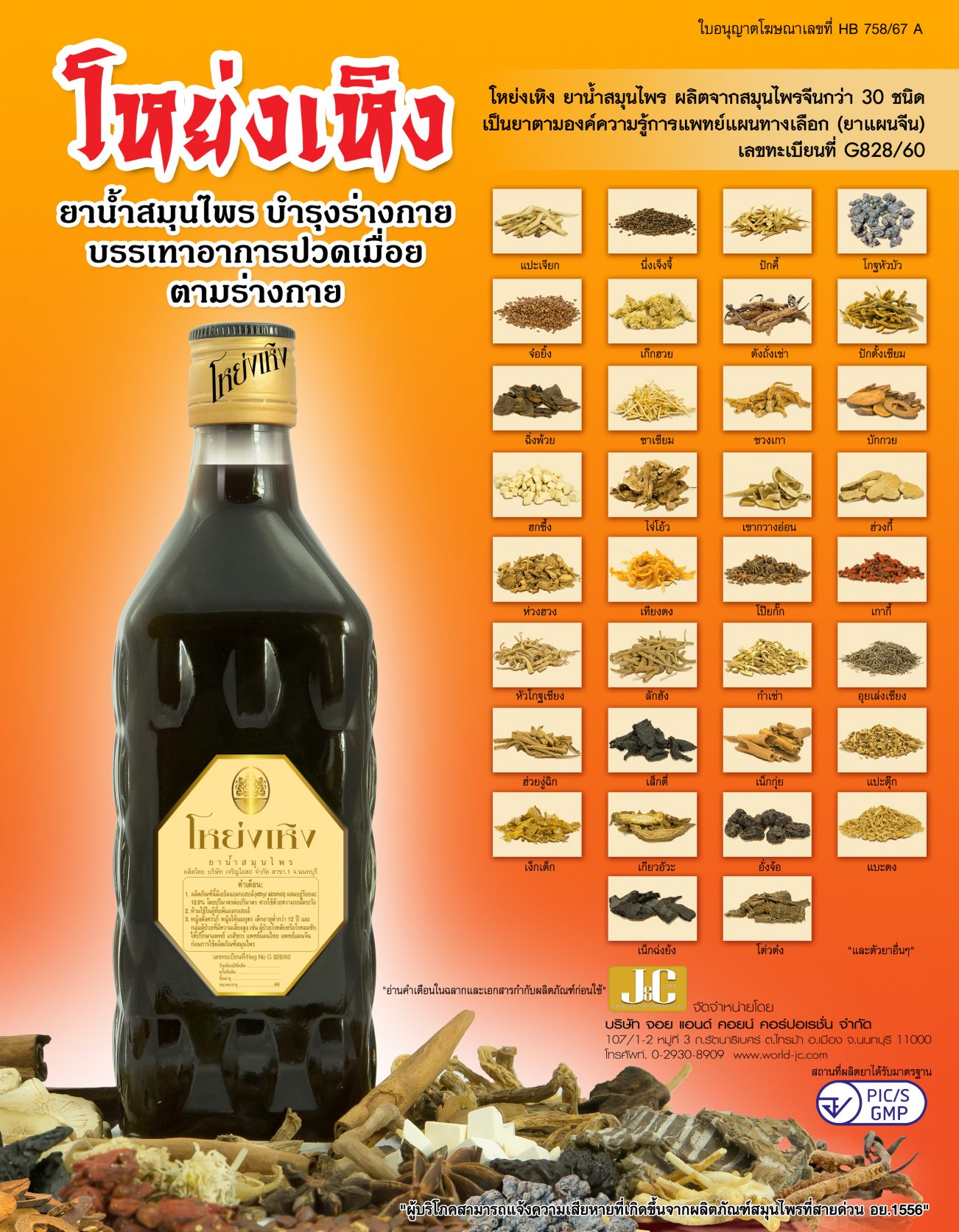KBank Private Banking ร่วมกับ Lombard Odier พันธมิตรทางธุรกิจ ไพรเวทแบงก์ระดับโลกจากสวิตเซอร์แลนด์ อัพเดทสถานการณ์และโอกาสลงทุนในกองทุนเปิด เค เอเชีย แปซิฟิก บอนด์ (K-APB) พร้อมเผยมุมมองต่อตลาดตราสารหนี้จีนที่จะได้ประโยชน์จากเศรษฐกิจที่แข็งแกร่ง แม้อัตราการติบโตจะชะลอลงบ้างจากผลของมาตรการสนับสนุนพิเศษทางการเงินและการคลังที่จะลดลง ทำให้กลยุทธ์การลงทุนในตราสารหนี้จีนรวมทั้งเอเชียมีโอกาสสร้างผลตอบแทนสม่ำเสมอให้พอร์ตการลงทุน โดยเฉลี่ยตราสารหนี้จีนให้ผลตอบแทนมากกว่าตราสารหนี้สหรัฐฯ ที่มีอายุและอันดับเครดิตที่เท่ากันถึง 1.5%
มร.ดีราช บาจาช Head of Asia Credit, Lombard Odier ให้ความเห็นว่า เศรษฐกิจจีนฟื้นตัวจากการแพร่ระบาดของโรคโควิด-19 ได้อย่างรวดเร็ว ทำให้กิจกรรมทางเศรษฐกิจกลับมาดำเนินตามปกติและนำหน้าประเทศหลักอื่นๆ ส่งผลให้อัตราการผิดนัดชำระหนี้ (Default rate) ในภาคเอกชนโดยรวมลดลง อย่างไรก็ตาม การดำเนินการตามแผนพัฒนาประเทศระยะยาวทำให้รัฐบาลจีนทยอยยกเลิกการอุ้มกิจการที่ไม่มีประสิทธิภาพ รวมทั้งออกนโยบายที่เข้มงวดมากขึ้นในบางภาคธุรกิจ เช่น อสังหาริมทรัพย์ เพื่อควบคุมความร้อนแรงที่สะสมในช่วง 20 ปี ที่ผ่านมา ทำให้อัตราการผิดนัดชำระหนี้ในภาครัฐวิสาหกิจและภาคธุรกิจที่ตกเป็นเป้าหมายเพิ่มขึ้น
Lombard Odier มองว่าตราสารหนี้เอกชนให้ผลตอบแทนคุ้มค่ากว่าพันธบัตรรัฐบาล และ Spread (อัตราผลตอบแทนส่วนเพิ่มจากพันธบัตรรัฐบาล) ของตราสารหนี้เอกชนระดับ Investment Grade ในเอเชีย (Asia IG Credit) นับว่าสูงกว่า Spread ของตราสารหนี้เอกชนในระดับเดียวกันทั่วโลก (Global IG Credit) นอกจากนี้ การแพร่ระบาดของโรคโควิด-19 ระลอกใหม่ในเอเชีย ทำให้ Spread ของตราสารหนี้ผลตอบแทนสูงในเอเชีย (Asia High Yield) เพิ่มขึ้น (ราคาลดลง) สวนทางกับ Spread ของตราสารหนี้ผลตอบแทนสูงในสหรัฐฯ (US High Yield) ที่ลดลง (ราคาเพิ่มขึ้น) จึงยิ่งเพิ่มโอกาสการลงทุนให้ตราสารหนี้เอกชนของเอเชีย
ในประเด็นความเสี่ยง ปริมาณตราสารหนี้ใหม่ที่จะเข้าสู่ตลาดไม่น่าสร้างผลกระทบมากนัก เนื่องจากบริษัทเอกชนหลายแห่งได้ออกตราสารหนี้เพื่อล็อคดอกเบี้ยกู้ยืมระยะยาวไปล่วงหน้าแล้ว ขณะที่ ความกังวลเรื่องบอนด์ยีลด์ระยะยาวที่อาจจะปรับสูงขึ้นอย่างรวดเร็วและรุนแรงจากการพุ่งขึ้นของเงินเฟ้อได้ผ่อนคลายลง ดังจะเห็นได้จากบอนด์ยีลด์สหรัฐฯ อายุ 10 ปี ที่ขยับลงจาก 1.78% ในช่วงเดือนเมษายน 2564 เหลือเพียง 1.22% ณ สิ้นเดือนกรกฏาคม 2564 ที่ผ่านมา

ด้าน นางสาวศิริพร สุวรรณการ Private Banking Financial Advisory Head, Private Banking Group ธนาคารกสิกรไทย ให้คำแนะนำว่า นักลงทุนควรทยอยสะสมเงินลงทุนในสินทรัพย์ให้หลากหลายประเภท ทั้งในและต่างประเทศ เพื่อให้พอร์ตการลงทุนเป็นแหล่งสร้างรายได้สม่ำเสมอและเงินลงทุนมีการเติบโตในระยะยาว สำหรับส่วนของตราสารหนี้ นักลงทุนที่รับความเสี่ยงได้ปานกลางสามารถเลือกลงทุนในกองทุน K-APB เป็นสัดส่วน 3-5% ของพอร์ต เนื่องจากผลตอบแทนของตราสารหนี้ในฝั่งจีนและเอเชียดีกว่ากลุ่มประเทศพัฒนาแล้ว โดยกองทุนนี้ให้ความสำคัญกับการคัดสรรตราสารหนี้คุณภาพดีจากบริษัทเอกชนที่มีปัจจัยพื้นฐานแข็งแกร่งและกำไรสุทธิขยายตัว รวมทั้งมีการกระจายเงินลงทุนในตราสารหนี้มากกว่า 300 รายการ จึงช่วยสนับสนุนพอร์ตโดยรวมทั้งในด้านการสร้างรายได้และพยุงมูลค่าเงินลงทุนในยามตลาดหุ้นผันผวน ขณะเดียวกัน นักลงทุนควรลดน้ำหนักการลงทุนในพันธบัตรรัฐบาล เพราะอัตราผลตอบแทนปัจจุบันต่ำมาก ทำให้รายได้น้อย และที่สำคัญรายได้นั้นไม่เพียงพอจะชดเชยกับแนวโน้มราคาที่อาจจะลดลงจากผลกระทบของบอนด์ยีลด์ขาขึ้นในอนาคตอันใกล้ได้
กองทุน K-APB เป็นกองทุนเปิดที่เน้นลงทุนในหน่วยลงทุน LO Funds – Asia Value Bond Fund, (USD) โดยจะลงทุนในตราสารหนี้ภูมิภาคเอเชีย-แปซิฟิก (รวมญี่ปุ่น) ที่อยู่ในสกุลเงินดอลลาร์สหรัฐฯ ซึ่งอาจลงทุนในตราสารหนี้ที่มีอันดับความน่าเชื่อถือต่ำกว่าที่สามารถลงทุนได้ (Non – Investment Grade) และตราสารหนี้ที่ไม่ได้รับการจัดอันดับความน่าเชื่อถือ (Unrated Securities) ได้
KBank Private Banking and Lombard Odier recommend investment in Asian bonds via K-APB as returns remain positive despite rising bond yields
KBank Private Banking (KPB) collaborated with a strategic alliance, Lombard Odier, in updating the market situation, highlighting the abounding investment opportunity of K Asia Pacific Bond Fund (K-APB). KPB and Lombard Odier jointly hold a positive view towards China’s bond market, which will benefit from the mainland’s strong economic momentum though it has slowed somewhat due to the easing effects of its special monetary and fiscal measures. Overall, both Chinese and Asian bond markets are likely to offer consistent returns for investment portfolios. On average, Chinese bond yields are currently 1.5 percent higher than those of their US counterparts with the same tenor and credit rating.
Mr. Dhiraj Bajaj, Head of Asia Credit, Lombard Odier, views that the Chinese economy could speedily rebound from the COVID-19 outbreak, as evidenced by its economic activity that has returned to normalcy ahead of other major countries. Therefore, the private sector’s default rates have been declining. Under its national long-term economic development plan, however, the Chinese government has gradually ended its support of inefficient state-owned enterprises while also implementing more stringent policies in certain sectors such as real estate in order to cool the overheating property market, which has been increasingly evident over the past 20 years. As a result, default rates of state-owned enterprises and other targeted businesses have been on the rise.
Lombard Odier is of the view that corporate bonds presently offer better returns than government bonds, and the spread of Asia investment grade credit is higher than the spread of global investment grade. Additionally, new COVID-19 waves across Asia have helped bolster the spread of Asia’s high- yield bonds (drop in value), in contrast to the decline in the spread of US high-yield bonds (increase in value), which presents an even greater investment opportunity in Asian debentures.
Regarding risks, the impact of an influx of new debt instruments in the market may be limited as companies have already issued debentures to lock in long-term lending rates in advance, while concerns over steep and swift increases in long-term bond yields as a result of rising inflation have eased, as evidenced by the decline in 10-year US Treasury yields from 1.78 percent in April 2021, to just 1.22 percent as of the end of July 2021.
Ms. Siriporn Suwannagarn, Private Banking Financial Advisory Head, Private Banking Group, KASIKORNBANK, said that investors should gradually rotate their investments in various asset classes at home and abroad to ensure that their investment portfolios generate regular income streams and long-term investment growth. With regard to debt instruments, investors with medium risk tolerance can choose to invest up to 3-5 percent of their investment portfolio in K-APB, as Chinese and Asian bond markets offer better returns than those of developed countries. The Fund focuses on selection of high-quality debt instruments offered by private firms with robust fundamentals and expanding net profit, as well as diversification of investment from selection of over 300 debt instruments. This investment portfolio will therefore generate income and support the value of the investment in times of stock market volatility. At the same time, investors are recommended to reduce the weight of government bonds in their portfolio due to the low government bond yields at present, leading to lower income. Moreover, the income would be insufficient to offset the potential downward trend in prices stemming from the expected rising bond yields in the near future.
The K-APB Fund is an open-end fund that invests mainly in LO Funds – Asia Value Bond Fund, (USD), focusing on investment in debt instruments from issuers in the Asia-Pacific region (including Japan) which is predominantly in USD. The Fund may also invest in non-investment grade debt instruments and unrated debt securities.
































































